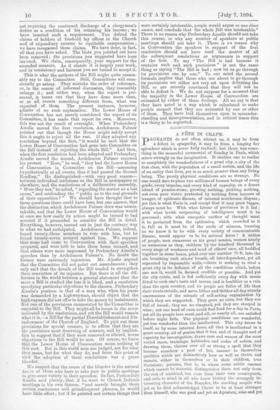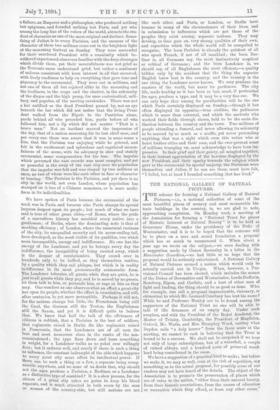A FETE IN CRAPE.
DAGEANTS do not often attract us, it may be from a defect in sympathy, it may be from a longing for splendour which is never fully realised ; but there was some- thing in the mournful ceremonial of Sunday in Paris, which seizes strongly on the imagination. It enables one to realise so completely the wonderfulness of a great city, a city of the first class, with the population of a small nation, and, the life of an entity that lives, yet is so much greater than any living being. The purely physical conditions are so strange. No one would dare to place two millions of human beings of every grade, every impulse, and every kind of capacity, on a desert island of pumice-stone, growing nothing, yielding nothing, not even pure water, protected by nothing from horrors of hunger, of epidemic disease, of internal murderous dispute ; yet this is what Paris is, and except that it may grow bigger, always must be. With what labour of provinces is it fed ; with what lavish outpouring of intelligence must it be governed ; with what energetic outflow of thought must it be protected from the epidemics, which crowded as it is, full as it must be of the seeds of miasma, teeming as we know it to be with every variety of communicable disease, would appear to be its natural doom ! A nation of people, men numerous as six great armies, women nearly as numerous as they, children by the hundred thousand in every stage of weakness and need of others' care, all huddled together in stone boxes, piled over one another 70 ft. into the air, breathing each others' breath, all interdependent, yet all separated by impassable walls,—there is nothing to rival a great city in its defiance of all the conditions which, before one saw it, would be deemed credible or possible. And yet the city exists, and is fed sufficiently every day with meals fitted to each one's taste and means, and is healthier as a rule than the open country, and its people are fuller of life than their rivals outside, and move hither and thither all day utterly unconscious of the miracle of self-acting organisation by which they are supported. They grow no corn, but they are full of bread; they see no vineyard, yet they are steeped in wine ; not one herd of oxen could find food for a day in Paris, yet-all its people love meat, and all, or nearly all, are satisfied before night falls. The physical conditions are wonderful, yet less wonderful than the intellectual. This city draws to itself, as by some internal force, all that is intellectual in a great country, all of genius that it has, and of thought and of capacity for investigation, draws men and women of the most varied races, trainings, habitudes, and codes of action, and drawing them, throws over all so strong a spell that they become somehow a part of her, assume to themselves qualities which are distinctively hers as well as theirs, and remain, either in themselves or in their children, true Parisians ; persons, that is, in whom some subtle essence which cannot be material, distinguishes them not only from the rest of mankind, but even from their own countrymen, and calls to mind in all who know history the strangely in- teresting character of the Founder, the mocking sceptic who yet as he died acknowledged Christ to be at least stronger than himself, who was good and yet an Apostate, wise and yet a failure, an Emperor and a philosopher, who produced nothing but epigrams, and founded nothing but Paris, and yet who among the long line of the rulers of the world, attracts the stu- dent of character as one of the most original and distinct. Some- thing of Julian is in every Parisian, and the oneness of the character of these two millions came out in the brightest light at the mourning festival on Sunday. They were sorrowful for their murdered President with a unanimity which be- wildered experienced observers familiar with the deep cleavages which divide them, yet their mournfulnehe was not grief as the Teutonic races understand grief, but rather a sentiment of sadness consistent with keen interest in all that occurred, with lively readiness to help on everything that gave tone and piquancy to the ceremonial. They were out in millions, and not one of them all but rejoiced alike in the mourning and the liveliness, in the crape and the chatter, in the solemnity of the dirges and the high pomp, for once ecclesiastical, mili- tary, and popular, of the moving cavalcades. There was not a hat unlifted as the dead President passed by, not an eye beneath the hat which did not notice that the living Presi- dent walked from the Elysee to the Pantheon alone, yards behind all who preceded him, yards before all who followed him, not a lip which did not mutter " That is a brave man." Not an incident marred the impression of the day, that of a nation mourning for its lost chief man, and yet every one there was aware that it was in some sense a fete, that the Parisian was enjoying while he grieved, and felt in the . excitement and splendour and regulated mourn- fulness of the scene, with its adequacy in slow and stately ceremonial, some compensation for his loss. The impulse which governed the vast crowds was most complex, and yet so powerful is the sway of the vast city over its population that the impulse was felt and was obeyed by two millions at once, no two of whom were like each other in face or character or bearing. The Parisian is the Parisian, and yet there is no city in the world, not even London, whose population has stamped on it less of a Chinese sameness, or is more multi- form in its individualities.
We have spoken of Paris because the ceremonial of the week was in Paris, and because also Paris stamps its special impress deepest upon its people ; but much of what we have said is true of other great cities,—of Rome, where the pride of a marvellous history has moulded every native into a gentleman; of Berlin, where the dominating note is that of mocking efficiency ; of London, where the unnatural vastness of the city, its unequalled security and its never-ending toil, have developed, as the most visible of its qualities, two which seem incompatible, energy and indifference. No one has the energy of the Londoner, and yet he betrays every day the indifference, the incapability of being carried away, which is the despair of revolutionists. They crowd over in hundreds only to be baffled, as they themselves confess, by a quality which they call phlegm, but which is in reality indifference in its most pronouncedly aristocratic form. The Londoner tolerates all guests while they are quiet, he is just to all guests while they pay, and he is moved by no guests, let them talk to him, or persuade him, or rage at him as they may. One wonders as one observes what an effect a• great city has upon its people, whether the effect is cumulative, and will, after centuries, be yet more perceptible. Perhaps it will not, for the nations change but little, the Frenchman being still the Gaul, the German still the Teuton, the Englishman still the Saxon, and yet it is difficult quite to believe that. We know that half the talk of the, effeteness of citizens is rubbish, that a Parisian is the best of soldiers, that regiments raised in Berlin die like regiments raised in Pomerania, that the Londoners are of all men the best and most numerous class in the ranks of the non- commissioned ; the type fines down and loses something in weight, for a Londoner walks as no yokel ever willingly does ; but it endures well, and surely if there is such a thing as influence, the constant indraught of the able which happens to every great city must affect its intellectual power. If there can be such a thing as a Jew, a separate being recog- nisable anywhere, and we none of us doubt that, why should not the ages produce a Parisian, a Berliner, or a Londoner as a distinctive type of mankind P It is a slow process, for the citizen of a great city takes no pains to keep his blood separate, and is much attracted in both sexes by the man or woman of the country-side, but still nations are not like each other, and Paris, or London, or Berlin have become in many of the circumstances of their lives, and in submission to influences which are pot those of the peoples they exist among, separate nations. They may develop, as time goes on, very strong qualities of their own, and capacities which the whole world will be compelled to recognise. The born Parisian is already the quickest of all who speak French, if not of all mankind ; the born Ber- liner is, all Germans say, the most instinctively sceptical or critical of Germans ; and the born Londoner is, we should say, of all Englishmen the most efficient,—a quality hidden only by the accident that the thing the superior English know best is the country, and the country is the one thing the Londoner never knows. We may produce the masters of the world, but never its gardeners. The city life, made healthy as it has been at last, must, if protracted for ages, produce a type, and it may be a very fine one. We can only hope that among its peculiarities will be the one which Paris certainly displayed on Sunday,—though it has often displayed its opposite,—true ciuilitas, the ,politeness which is more than external, and which the ancients who worked their fields• through slaves, held to be the main dis- tinction between the country and the town. Two millions of people attending a funeral, and never allowing its solemnity to be marred by so much as a scuffle, yet never pretending anything, that was a sight which even this writer who at heart loathes cities and their roar, and the ever-present sense of millions tramping on, must acknowledge to have been im- pressive. In their grief and their gaiety, all mingled together, in their instant appreciation of the heroism displayed by the new President, and their apathy towards the religion which gave to the ceremonial its special majesty, the Parisians were themselves, and Julian, if he can see them, must have felt, "I failed, but at least I founded something ghat has lived."











































 Previous page
Previous page